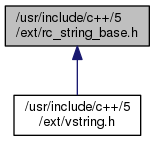This is an internal header file, included by other library headers. More...


Functions | |
| namespace __gnu_cxx | _GLIBCXX_VISIBILITY (default) |
This is an internal header file, included by other library headers.
Do not attempt to use it directly. {ext/vstring.h}
| namespace __gnu_cxx _GLIBCXX_VISIBILITY | ( | default | ) |
Documentation? What's that? Nathan Myers ncm@cantrip.org.
A string looks like this:
Where the _M_p points to the first character in the string, and you cast it to a pointer-to-_Rep and subtract 1 to get a pointer to the header.
This approach has the enormous advantage that a string object requires only one allocation. All the ugliness is confined within a single pair of inline functions, which each compile to a single add instruction: _Rep::_M_refdata(), and __rc_string_base::_M_rep(); and the allocation function which gets a block of raw bytes and with room enough and constructs a _Rep object at the front.
The reason you want _M_data pointing to the character array and not the _Rep is so that the debugger can see the string contents. (Probably we should add a non-inline member to get the _Rep for the debugger to use, so users can check the actual string length.)
Note that the _Rep object is a POD so that you can have a static empty string _Rep object already constructed before static constructors have run. The reference-count encoding is chosen so that a 0 indicates one reference, so you never try to destroy the empty-string _Rep object.
All but the last paragraph is considered pretty conventional for a C++ string implementation.
References __catch, __gnu_profile::__size(), __throw_exception_again, and __try.
